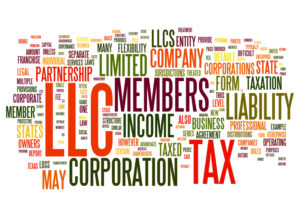Limited Liability Company LLC

As a small business owner, protecting your personal assets and your company is a high priority. Forming your business as an LLC, or Limited Liability Company, allows you to do this quickly and flexibly, while minimizing your tax burden.
When you are ready to formally separate your business and personal assets, but don’t intend to go public or take on outside investment, an LLC can be a great option. Weighing the pros and cons of an any business structure is critical, which is why discussing your options with an experienced corporate lawyer can help you make the optimal, best-informed decision.
What is an LLC?
An LLC is a distinct corporate entity with the ability to use its own a tax identification number, open a bank account and do business under its own name. The LLC operates as a type of hybrid of a corporation and a partnership. Like a corporation, an LLC limits the legal liabilities of the owners, called “members.” Like a partnership, the LLC is a pass-though entity for tax purposes, which means that individual members are taxed only once on any profits to the LLC, as a form of personal income (unless they elect otherwise in the Operating Agreement).
Operating Agreements
An LLC is governed by an operating agreement that details member responsibilities, operating procedures, governance, and any other business and legal frameworks needed. LLCs are offered a lot of flexibility in terms of structure, which means that the operating agreement is vitally important. In an operating agreement, you can select tax structure, member rights, and really just about any facet of your business to fit the needs of your business. Unlike bylaws for a corporation, in most states, an operating agreement is optional for an LLC. Many single-member LLCs operate without an operating agreement.
Advantages of an LLC
There are many advantages to forming as an LLC. The following are the three most important to most small business owners:
- No Double Taxation. Since profits are not taxed at the company level, profits disbursed to members are not taxed twice.
- Less Paperwork. There is less required compliance needed to be an LLC in good legal standing. That means that you generally file less paperwork and less is required to establish a formal LLC.
- More Flexibility. Everything about an LLC can be customized. With a well-written operating agreement, you and your corporate lawyer can you can create specific rules that govern your business in the most advantageous way possible considering your unique corporate reality. This makes LLCs highly scalable and easy to adapt to changing corporate realities.
Disadvantages of an LLC
LLCs also have some serious disadvantages. The following are two of the most important to consider before choosing an LLC.
- Less Attractive to Investors. Most investors prefer to only invest in C-Corps, due to the predictable structure and the ease with which they can be issued stocks. LLCs cannot issue stocks, which means that becoming a member is generally more complex. If you are looking to go public, an LLC may not be the best choice.
- Higher Personal Taxes. While you are not going to be subject to double taxation, LLCs traditionally tax as pass-thorough entities, which means that, as a member, you may be responsible for the higher self-employment taxes personally because you will be taking a “draw” as opposed to a salary.
Our law firm can help you decide whether an LLC is the right form for your business. In order to do so, they’ll likely ask a series of questions about your current situation and future plans. If you want to get a sense of the types of questions that you should be prepared to answer, you can review and complete our business formation checklist. Once you’ve selected the appropriate corporate form, we will walk you through completing your formation and drafting governance documents.
What is the difference between an LLC and a traditional corporation?
While an LLC may be an alternative to a corporation, they are actually unincorporated business entities. LLCs have much more operational flexibility and fewer required filings and avoid the kind of double taxation that C-Corps face. On the other hand, traditional corporations are more attractive to investors and taxation and accounting requirements are less complex. C-Corps tend to be more regimented, so LLCs can be an attractive alternative if you’ve looking for operational flexibility.
Are all LLCs pass-through entities for taxation purposes?
While most LLCs are pass-though entities and it is generally considered to be a characteristic of an LLC, it is not always the case. Taxation is flexible in an LLC as is most anything else. This means that you can also choose to have your LLC taxed as a corporation.


